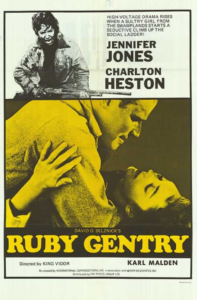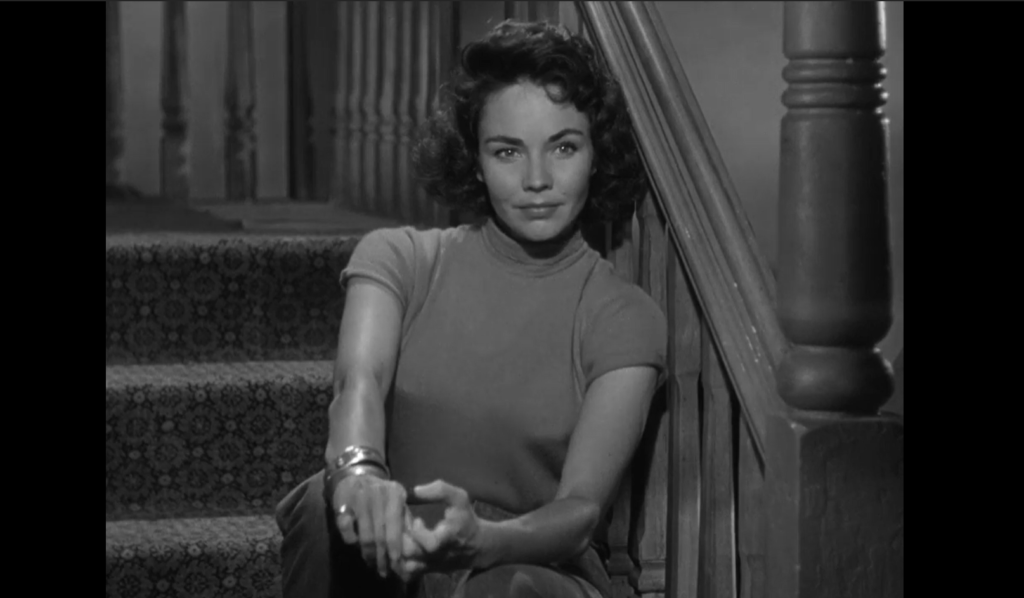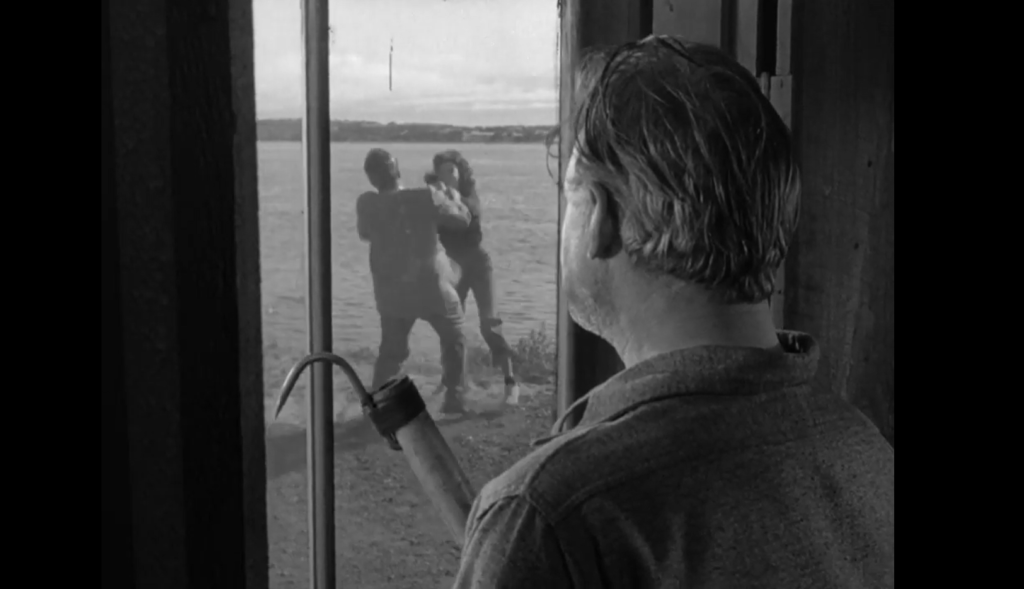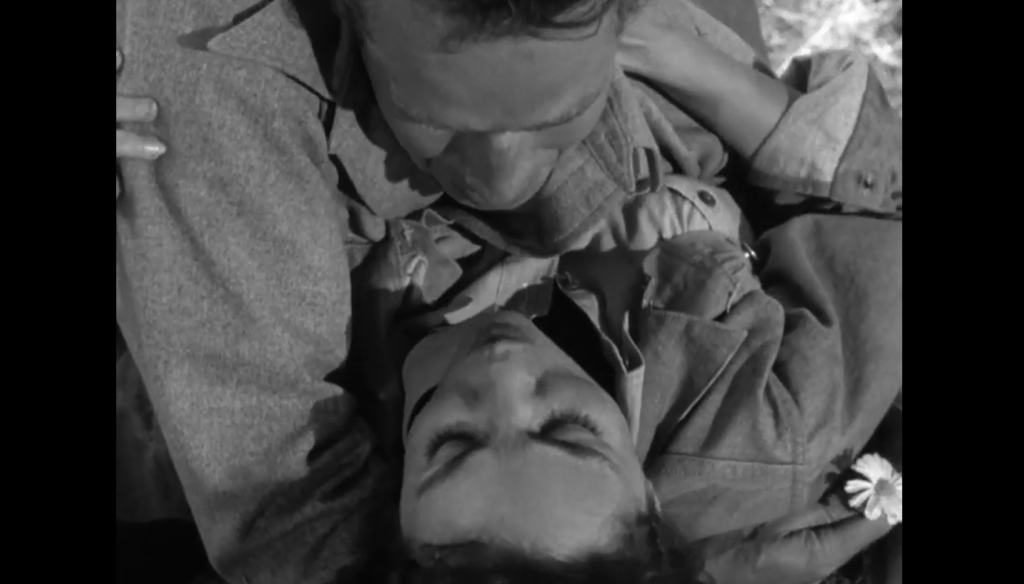“No woman like her: one minute fighting, scratching, the next minute she’s as sweet and soft as any woman alive.”
|

Synopsis:
A young woman (Jennifer Jones) from the “wrong side of the tracks” — who has been adopted by businessman Jim Gentry (Karl Malden) and his sickly wife (Josephine Hutchinson) — is dismayed when her lover (Charlton Heston) decides to marry a wealthy socialite (Phyllis Avery). Ruby (Jones) makes the best of things by marrying Malden once his wife passes away, but society still won’t accept Ruby — and when a tragic accident ensues, the town’s relentless disparagement drives Ruby to seek revenge.
|
|
Genres, Themes, Actors, and Directors:
- Charlton Heston Films
- Class Relations
- Cross-Class Romance
- Deep South
- Jennifer Jones Films
- Karl Malden Films
- King Vidor Films
- Revenge
- Strong Females
Review:
Peary doesn’t review this King Vidor-directed melodrama in his GFTFF, but he designates it as a Personal Recommendation in the back of his book, and names Jones one of the Best Actresses of the Year in his Alternate Oscars. Unfortunately, I’m more in alignment with DVD Savant’s critical review of the film, which he refers to as a “ragged bush-league soap opera” in which “a lusty female is the source of all evil”. Savant writes that while “Jones had great gifts as an actress,” her “roles in many of her American films post-Duel in the Sun” — including this one — “are gross caricatures”; and he notes that while “the forced theatrics are not quite as exaggerated as Pearl Chavez’ antics in Duel in the Sun,” “they’re also not as entertaining” — though “fans of champion scenery chewing will find plenty of delight amid Heston’s strutting and Jennifer Jones’ over-emphatic presence.” Indeed, there’s very little to recommend about this clunker, which seems poorly conceived on every level. The voice-over narration by a timid doctor (Barney Phillips) secretly in love with Ruby feels out of place, and Ruby’s character veers wildly from beginning to end. She’s most enjoyable about an hour into the film, when things suddenly get a lot more interesting — though at this point there are only 20 minutes left in the all-around unbelievable storyline, and we’re simply waiting to see how things will resolve.
Redeeming Qualities and Moments:
- Russell Harlan’s cinematography



Must See?
No; you can skip this one. Listed as a Personal Recommendation in the back of Peary’s book.
Links:
|
One thought on “Ruby Gentry (1952)”
Not must-see. As per my 9/14/20 post in ‘The ’40s-’50s in Film’ (fb):
“But you can’t buy your way out of the swamp – and you can’t buy me!”
‘Ruby Gentry’ (1952): I might like to read King Vidor’s autobiography, ‘A Tree is a Tree’. He was certainly among our more unusual directors. In his book, he writes, “The march of man, as I see it, is not from the cradle to the grave. It is instead, from the animal or physical to the spiritual. The airplane, the atom bomb, radio, radar, television are all evidences of the urge to overcome the limitations of the physical in favor of the freedom of the spirit.” That sentiment seems embedded in a number of Vidor’s fine earlier films. However… a 6-year period starting in the mid-’40s brought KV a series of projects chronicling angst-ridden love; stories in which characters could not “overcome the limitations of the physical”. Some of these films have the misfortune (or distinction, depending on how you look at it) of being howlers (‘Duel in the Sun’, ‘Beyond the Forest’ and – one of my fave films, even though, or maybe because, it’s so thoroughly insane, ‘The Fountainhead’). But, along with ‘Lightning Strikes Twice’, ‘Ruby Gentry’ is not exactly unintentionally funny (though, at moments, I think it would like to be). ‘RG’ is sort of a companion piece to ‘DITS’; not only does it reunite Jennifer Jones with the director but it is yet another tale in which Jones is “from the wrong side of the tracks” and, thus, is “not good enough” for the man she really wants (in this case, Charlton Heston). Though it’s well-directed (and, wisely, short at 82 min.), much of the film seems in danger of remaining tepid, turgid melodrama – but luckily it builds with a significant turn of events, which then allows Jones the golden opportunity to hit pay dirt with the wild release of Ruby’s long-held frustration. It’s a weird little film… but I sure get a kick out of the last half-hour or so.